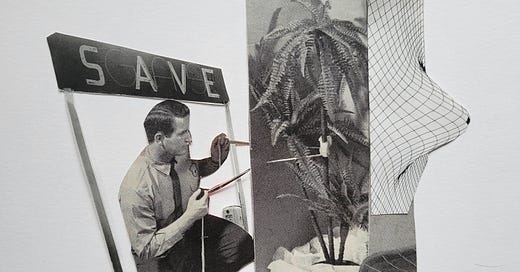E37. Lou Reed’s Nephew on Lou Reed’s Nephew’s Narrator’s Epic Pivot
"Though we rarely speak of it, technology is a mess. It’s riddled with mistakes, and these mistakes compound on one another daily, like the brain separated from the mind."
“So, you’ve seen the light,” Lou Reed’s Nephew said when I arrived.
“What light?”
“The people light,” he said. “Ulugbek told me.”
Ulugbek? How was that possible?
“How is that possible?” I asked.
“He emailed me.”
Ulugbek had explained to me thousands of times that he could not be reached by email and that if I attempted to send him an email, I shouldn’t expect a response.
“How do you know Ulugbek?”
“LinkedIn.”
“LinkedIn?”
“Right,” he said. “It said he was someone I might know. I didn’t, but now I do. Don’t worry. You’re doing the right thing.”
He could tell I felt weird about it.
“It feels weird,” he said. “This idea that you will be creating—or already have been creating—a comprehensive database of places and events, including people. We were raised to believe there was something wrong with that, unlike Ulugbek.”
“Because he’s Russian?”
“Russian-speaking,” Lou Reed’s Nephew corrected.
“How do you know so much about Ulugbek?”
“He calls at night, after you’re gone. Brilliant guy.”
I had never spoken to Ulugbek on the phone.
“So why shouldn’t I feel bad about creating a complete database of place and events, including people? I’ll be going from helping people find things to do to watching what they do.”
“You could look at it that way,” Lou Reed’s Nephew said. “Or you could think of it as art.”
“I don’t understand.”
“If it were perfect, it would be surveillance,” he said. “You would be constructing a perfect record of every person, everywhere they had been, and everything they had done.”
“That’s what I’m afraid of,” I said. I could see the tables in my mind. The ones with the names and unique identifiers. Social Security numbers and birth dates. Places and events seemed so innocent by comparison. These new tables made me shiver.
“But that would only be if it were perfect, and it won’t be. Though we rarely speak of it, technology is a mess. It’s riddled with mistakes, and these mistakes compound on one another daily, like the brain separated from the mind. The more technology there is, the more errors there are, the more the models—like your database—stray from reality. They are like the Emilys at Camel Toe, arcing away from reality like dying rockets.”
I thought of the Challenger disaster, which I had watched on television in middle school but knew Lou Reed’s Nephew wouldn’t get the reference.
“You imagine, like the scholars who built the Library at Alexandria, that you are building a perfect accounting of human knowledge, but you’re just amplifying half-truths and misunderstandings, now at unbelievable speeds. Can you even imagine the wonderful world you are creating?”
“What …”
“Think of the imaginary creatures that are created when entities are mistakenly joined together by a shared attribute.”
“Like the same name.”
“Or address. Or the same date of birth. The same favorite pet. You imagine that you are getting it right, but every ambiguous attribute, every error, forges an association that creates something new. A baby who is an old woman. Someone who lives in Tucson but also in Duluth. Someone who is alive but also dead. One day, there might even be an online creature that is a combination of you and me. Wouldn’t that be funny? You are creating a menagerie of data minotaurs, a brave new world.”
“That has such creatures in it,” I said, hoping Lou Reed’s Nephew would understand that I was completing his reference. He didn’t. Huxley but not Shakespeare.
“But what if this world falls into the wrong hands?” I said. “Imaginary worlds have real implications.”
“Unfortunate, but each time that happens will testify to our freedom from what you have created. Each person who shows up at the wrong address on the wrong day. Each person who gets lost on the way to a hatchet-throwing event. Each person who is mistaken for someone else and ends up buried in red tape, having to prove who they really are, that they don’t have a history of cancer or that, no, they weren’t there on the night in question. Each victim will be a martyr to liberté, as Margaux says. Her accent is so cute.”
“Margaux?”
Why was he talking about Margaux?
“Why are you talking about Margaux?” I asked.
“We’ve been hanging out a little,” he said. “Stunning fingers.”
“And this is what Ulugbek thinks? That we are making art whose innocent victims will be martyrs to liberté?”
“No, he’s just into surveillance,” Lou Reed’s Nephew said. “You know how Russians are.”




